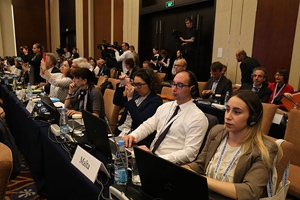Ru
|
Eng
Belarus urges Lithuania to discuss nuclear power plant construction via open dialogue
13.06.2017

Belarus would like Lithuania to talk about the construction of the nuclear power plant via an open dialogue. Belarusian First Deputy Natural Resources and Environmental Protection Minister Iya Malkina made the relevant statement on the sidelines of the 7th session of the Meeting of the Parties to the Espoo Convention on 13 June, BelTA has learned.
The official said: “We would like to work. We are open to our colleagues and neighbors. We urge them to have a dialogue with us and will continue doing so.”
Belarus remains committed to the idea that problems should be resolved through dialogue. “This is why by all means we encourage the Lithuanian government to use various platforms in order to talk in a positive manner, in order to look for a way out,” said the official.
The 7th session of the Meeting of the Parties to the Espoo Convention is scheduled to take place in Minsk on 13-16 June. About 200 people representing 45 countries parties to the Espoo Convention are taking part in the events. Among them are ministers and deputy minister for environmental protection ministries and other agencies, high-ranking officials of international organizations and financial institutions, representatives of the general public. The final joint high-level session is supposed to pass a Minsk declaration. Participants of the session are expected to discuss the construction of the Belarusian nuclear power plant among other things.
The Convention on Environmental Impact Assessment in a Transboundary Context was adopted in Espoo, Finland on 25 February 1991 to come into force on 10 September 1997. It has been ratified by 45 countries. The Espoo Convention obliges the signatories to carry out an environmental impact assessment of certain activities at an early stage of planning. It also lays down general obligations of the parties to the Convention to notify and consult each other on all major projects under consideration if such projects are likely to adversely affect the environment beyond national borders.
BELNPP: NEWS FROM CONSTRUCTION SITE
23.07.2024
11.07.2024
28.06.2024
06.06.2024
04.06.2024
04.06.2024
03.06.2024
24.05.2024
23.05.2024
03.05.2024













